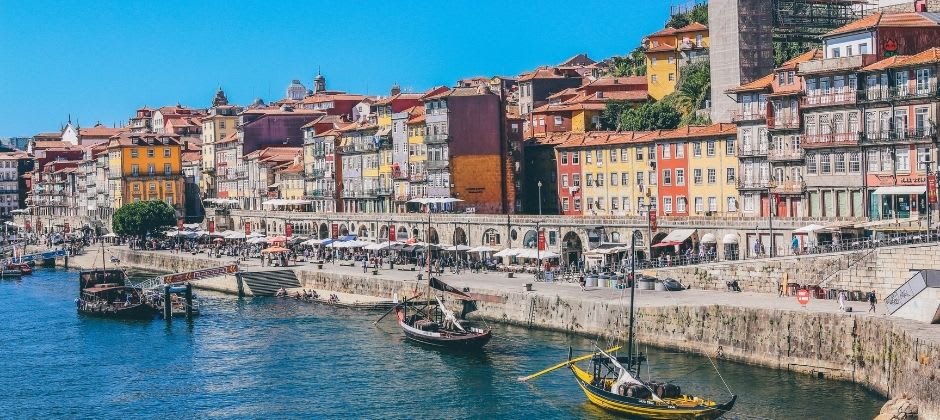Study in Portugal: Education in Portugal
Alongside 47 other European nations, Portugal is a signatory to the Bologna Process, a Europe-wide strategy to harmonize the architecture of European higher education and promote educational mobility and modernization. The Bologna Process, first signed in 1999, aimed to widen access to higher education across Europe and allows for educational exchanges between countries.

Alongside 47 other European nations, Portugal is a signatory to the Bologna Process, a Europe-wide strategy to harmonize the architecture of European higher education and promote educational mobility and modernization. The Bologna Process, first signed in 1999, aimed to widen access to higher education across Europe and allows for educational exchanges between countries while guaranteeing universal standards across European higher education institutions.
Higher education in Portugal today, therefore, follows the traditional three-cycle format, split into undergraduate (Bachelor’s), graduate (Master’s) and postgraduate (Doctorate) certifications. Understanding the education system will help you feel well prepared to get in to an international university.
Polytechnics and Universities
Educational institutions in Portugal are divided into traditional universities and polytechnical schools that provide more practical and profession-oriented training. Both types of institutions have public and private counterparts spread across Portugal. There are currently 14 public universities and 36 private universities in Portugal, with 20 public polytechnics in Portugal and 64 private polytechnics.
Polytechnic universities provide vocational, career-based training in fields such as nursing, education, accounting and healthcare, while degrees in medicine, law, natural sciences, economics or psychology are offered by universities. There is also some crossover, with fields of study including engineering, technology, management, education, sports and humanities being taught in both university and polytechnic systems. Generally, if you’re looking to pursue a more general, overall education you should look towards studying at universities in Portugal, while students pursuing their studies in a more practical or hands-on field should apply for a polytechnic university.
Types of Degrees
Bachelor’s Degrees (LICENCIADO)
Both universities and polytechnics confer bachelor’s degrees in Portugal. In the polytechnic system, the completion of a bachelor’s certification requires 180 ECTS (European credits) and usually consists of six semesters, or three years of study. At Portuguese universities, depending on your program you may be required to obtain between 180 and 240 ECTS, usually six to eight semesters or three to four years of study.
Master’s Degrees
Portuguese universities and polytechnics both offer master’s degrees. A master’s degree from a polytechnical institution aims to provide students with a professional specialization, while master’s degrees from universities focus on innovation and have more of a research focus. In both types of institutions, students must obtain 90 to 120 ECTS over a duration of three to four semesters (one to two years), although for some more specialized programs such as medicine or law, obtaining a master’s designation can require a longer period of study. As well as obtaining the correct number of credits, all master’s students are required to publicly defend their dissertation, project work or traineeship reports in order to finalize their certification.
DOCTORATE
Doctorate/PhD programs in Portugal can be obtained at universities and university institutes. These are independent research degrees overseen by academics who are well-established in their fields. Like master’s students, doctoral students are required to publicly defend their thesis at the end of their degree. A doctorate degree can take up to three years of study and research.
Language Courses
The language of instruction at universities in Portugal is mostly Portuguese at the bachelor’s level. Some programs are offered in English at the bachelor’s level, and more at the master’s level If your first language is not English, you may have to prove your English capabilities through TOEFL or IELTS test results. Most universities will require a minimum level of proficiency in Portuguese or English at the B1 or B2 level. If you’re looking to brush up on your skills, taking a language class in Portuguese is a great way to make sure your language skills are up to par while you pursue your studies in Portugal.
Overview of Portugal
Over 50,000 international students choose Portugal as their study abroad destination every year. Click here to learn why.
Student Visas
The student visa requirements for studying Portugal depend on your nationality. The rules differ for EU/EEA nationals and non-EU/EEA nationals. Read here to learn more about what you might need.
Housing & Living Costs
Compared to many other European nations, students who choose Portugal as their study abroad destination can look forward to a more budget-friendly experience overall.
Tuition Fees & Scholarships
Higher education institutions in Portugal independently choose how much they want to charge both national and international students. Take a look at some of these costs here.
Language & Culture
With about 260 million speakers worldwide, Portuguese is the sixth most spoken language in the world. Find out more about what the country offers in terms of language, culture, and more!
Application Process
All countries have specific admissions requirements for students to gain acceptance into a university. Learn more about the ins and outs of admission to programs in Portugal, and what you need to apply.
Programs
Interested in studying in Portugal? Use our search engine to find and compare top programs in Portugal today!

Author
The Keystone Team is comprised of experienced educators and advisors dedicated to providing valuable resources and advice to students all over the world.